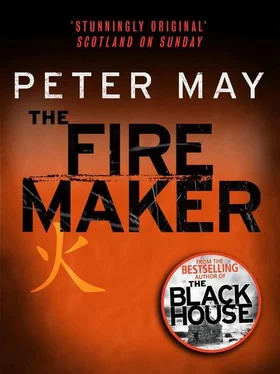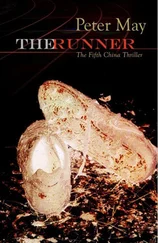She chased after him. ‘Yes it does. If he wanted you to make the connection, it means he had a motive for doing so.’
‘Of course,’ Li said. ‘But it doesn’t help us know what that motive is. We need more information.’
Margaret tutted her irritation. ‘Well, thanks for the thought, Margaret, it was really helpful.’
Her sarcastic edge and serrated tongue were becoming familiar to him. He decided to play dumb. ‘It was,’ he said, as if blissfully unaware of her tone. He smiled to himself as he heard her gasp of exasperation. Perhaps he was finally beginning to get her measure.
Mei Yuan sat on a stool by her jian bing ‘house’ on the corner of Dongzhimennei. Business was slow, but she was not unhappy. It gave her time to read. She had almost finished her copy of Meditations , and it was from some cold imagined Dutch medieval landscape that she had to drag herself as a dark blue Beijing Jeep pulled up at the kerb and a pale, blonde Western woman in a lemon dress got out of the passenger side. Then she saw Li coming round the bonnet, and her face broke into a smile. ‘Hey, Li Yan, have you eaten?’
‘Yes, I have eaten, Mei Yuan. But I am hungry.’
‘Good. I will make you a jian bing .’ She lit the gas under her hot plate and looked at Margaret. ‘Two?’
‘Two,’ said Li. And in English, ‘Mei Yuan, this is Dr Margaret Campbell, a forensic pathologist from the United States.’
‘Ah.’ Mei Yuan held out a plump hand. ‘Are you here on holiday or on business?’
Margaret was taken aback by the perfect English that rolled fluently off the tongue of what she had taken to be a peasant street vendor. ‘I’m lecturing at the People’s University of Public Security,’ she said.
‘And are you a practising pathologist, or an academic?’
Again Margaret was startled. ‘Practising,’ she said. ‘I only lecture part-time.’ And then, ‘You speak excellent English.’
‘Thank you,’ Mei Yuan said. ‘I get very little chance to practise it nowadays. So I am what you would call a little rusty.’
‘No, not at all.’ Margaret glanced at Li for illumination.
‘Mei Yuan was a graduate of art and literature at Beijing University in the late fifties,’ he said.
Mei Yuan added, without any apparent regret, ‘But my life did not follow an academic course. I spent most of it in the countryside in Hunan province. I only returned to Beijing a few years ago when my husband died.’ She turned to Li. ‘You missed breakfast.’
‘I was too early for you.’
‘I think, perhaps, my riddle was too difficult for you. You were avoiding me.’
Li laughed. ‘No, I wasn’t. I figured that out yesterday afternoon.’
‘Figured what out?’ Margaret asked.
Li shook his head, smiling. ‘It’s a sort of game we play,’ he explained. ‘I usually stop for breakfast on the way to work. Mei Yuan will pose me a problem, or a riddle. I’ve got till the next day to figure it out. If I come up with the right answer, I set her one. Mind games.’
Mei Yuan laughed. ‘Mindless games. For people with nothing better to do at that time of the morning.’
‘So what was the riddle?’ Margaret was intrigued.
‘There are two men,’ said Li. ‘One of them is the keeper of all books, giving him access to all knowledge. Knowledge is power, so he is very powerful. The other has only two sticks. But they give him more power than the other. Why?’
Margaret thought for a moment. ‘That’s easy,’ she said.
Li looked at her sceptically. ‘Oh, sure.’
‘We have a saying at home about not having two pennies to rub together — meaning you are very poor. But if you have two sticks to rub together, you can make fire. And if you can make fire you can burn books and destroy the knowledge they contain. You take away knowledge, you take away power.’
Mei Yuan clapped her hands in delight. ‘Very good.’
Li was astonished, and full of grudging admiration. ‘It took me all day to work that out.’
Margaret grinned, and as Mei Yuan prepared their jian bings asked her about the book she was reading.
‘ Meditations ,’ she said.
‘Descartes?’ Margaret was taken aback.
Mei Yuan nodded. ‘Have you read it?’
‘No. I suppose I should have. But there are so many books. You can’t read them all.’
‘If I had one wish in life,’ said Mei Yuan, ‘it would be that I could spend the rest of it doing nothing else all day but reading.’
Li remembered the books lining the wall in Chao Heng’s apartment, and wondered if he had read them all.
Margaret bit into her jian bing and crunched it cautiously. ‘Hmmm,’ she said enthusiastically. ‘It’s fantastic.’ And then quickly, ‘It’s not going to burn the mouth off me, is it?’
Li laughed. ‘Not this time. Just a gentle chili burn.’ And she felt the slow warmth and the flavours fill her mouth.
Mei Yuan handed one to Li. ‘So,’ she said. ‘You have something for me today?’
Li’s mouth was full of jian bing . He shrugged apologetically. ‘I haven’t had a chance to think of anything, Mei Yuan. I have a big investigation on.’
She waggled a finger at him. ‘This is no excuse.’
‘Okay,’ he said, his mind turning over quickly. ‘What about this? A man commits three perfect murders on the same night. There is nothing to connect them to one another, or to him. But he quite deliberately leaves a clue beside each victim which makes it clear that they were all killed by the same man. Why does he do this?’
‘That’s not fair,’ Margaret said.
Mei Yuan looked at her, puzzled. ‘You know the answer to this?’
‘No, I don’t.’
‘Then it must be very difficult.’ She thought for a moment. ‘What sort of clue does he leave?’
‘A cigarette end. He is clever enough to know that traces of his saliva will remain on the paper and that the police will discover that the DNA in the saliva from each cigarette end is the same.’
She looked from one to the other. ‘Is this real?’
Li nodded grimly. ‘I’m afraid it is.’
‘Then I will think about it,’ said Mei Yuan seriously. ‘And if you ask me tomorrow I will tell you what I have thought.’
Li smiled. ‘I only hope I will know the answer by then, so that I can tell you if you are right or wrong.’
In the Jeep, as they headed north through the traffic chaos of bicycles and buses in the narrow Chaoyangmen Nanxiaojie Street, Margaret said, ‘Why is a woman like that selling fast food on a street corner?’
Li shrugged. ‘The Cultural Revolution ruined many lives in China. Hers was only one.’
Margaret shook her head in exasperation. ‘What exactly was the Cultural Revolution?’ And she was immediately embarrassed by her ignorance. ‘I mean, I know I should probably know. But it was a long time ago in a far-off place… from America, that is.’ She flicked a glance at him. ‘Jesus, I never realised how little I knew about the rest of the world until I came here.’
Li glanced at her across the Jeep and thought for a moment. ‘You know how it is, as a young person, to feel you have no control over your life, that everything is run by old people? And that by the time you are old enough to change things, you are too old to enjoy them? Well, the Cultural Revolution reversed all that. It gave power to the young, to change things while they were young.’ He shivered in the heat as memories of his childhood came flooding back.
‘Young people came from all over China to Beijing to become Red Guards and parade in front of Mao in Tiananmen Square. For them, Mao was the “red, red sun in their hearts”. But really, they were just children with all discipline removed. They went crazy. They attacked people just because they were “intellectuals”. They could come into your house and take over your home. And you would be “criticised”, and maybe you would have to write essays criticising yourself, or they would force you through “struggle sessions” or maybe just beat you up for fun. Many people were put in prisons or sent to labour camps. Others were killed — just murdered. And nothing would happen to those who killed them because the legal system had fallen apart, and most policemen were in prison themselves or had been sent to labour in the countryside.’
Читать дальше












